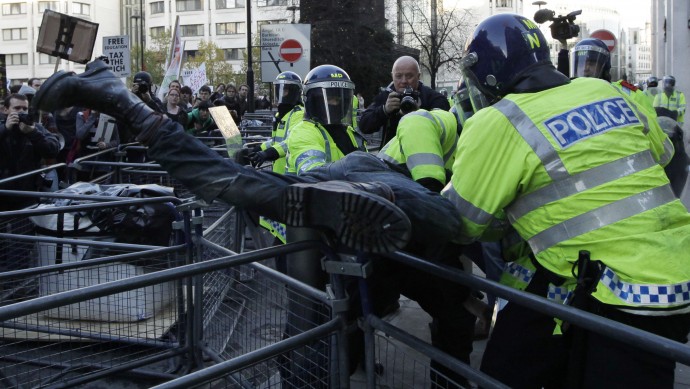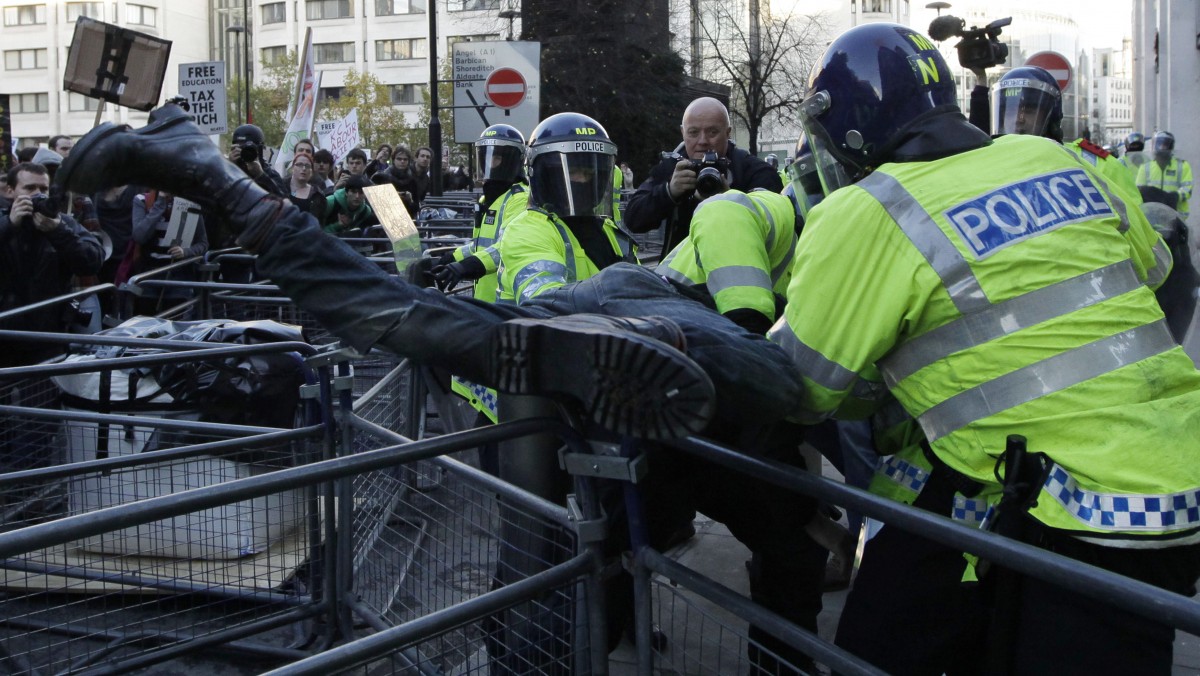
Update — Approximately 10,000 Quebec residents took to the streets of Montreal Saturday in defiance of a recent law restricting public protests. The crowd, comprised mostly of students protesting proposed tuition hikes, contributed to the public cacophony by banging pots and pans. The police declared the march “illegal” but allowed it to proceed without incident. Student protesters continue to take to the street in daily protest of Bill 78, the emergency law that was quickly passed to stifle public opposition to tuition increases across Quebec’s Universities.
(Mint Press)–On Wednesday, 518 protesters were arrested in one of the largest student demonstrations in Quebec, Canada. The demonstration, estimated to include 300,000 students, members of unions and other allies, is part of the ongoing movement against proposed tuition hikes across the province. Many students, particularly from francophone educational institutions have pushed to maintain current tuition rates.
In an attempt to break the three month old student strikes, the government of Quebec has implemented Bill 78, a set of “emergency laws” with stiff fines for demonstrators who violate the new provisions. Despite the crackdown, thousands of students continue to take to the streets in daily defiance of the order.
Government crackdown
The emergency law, designed to limit the scope of protests, requires that police be notified at least 8 hours in advance for demonstrations that involve more than 50 people. The law also requires protesters to tell police of the exact route they will take, along with any changes should the route be amended.
Additionally, the legislation imposes harsh fines on students and faculty who take part in unsanctioned protests. Student leaders can expect to pay fines ranging from $7,000 to $35,000, and any student union found preventing others from entering an education institution can expect a steep $125,000 fine according to a recent report by the Montreal Gazette.
Students have quickly challenged the legality of the ruling. Represented by a non-profit legal team, the main student groups, Fédération étudiante collégiale du Québec and the Fédération étudiante universitaire du Québec, have collected 150,000 signatures in support of their effort to challenge Bill 78. The students will be in court next week to present their case and are expected to argue that the law infringes upon the right to free assembly.
Marc Antoine Cloutier, the main lawyer in the case has said that there has been strong support from the legal community in Quebec, having received 500 emails from lawyers in the province willing to offer their services pro bono. Louis Masson, representing the Quebec Bar Association (QBA) has said that the QBA opposes Bill 78, saying in a recent statement with the Montreal Gazette, “We have serious concerns about this bill and the bill infringes upon many of the fundamental rights of our citizens.”
Canadian tuition hikes
The Canadian student protests began in 2003 when University administrators asked the Quebec government headed by Premier Jean Charest’s liberal party to lift the long-standing freeze on tuition fees. In 2003, Quebec University tuition stood at $1,862, a fraction of the $4,025 average throughout Canada.
While the Quebec government has agreed to a longer time scale for implementing the proposed tuition increases, students protesters remain steadfast in their belief that any tuition hike is unwarranted. Current tuition stands at $2,200 and the government of Quebec plans to increase tuition by $1,625.
While the government has moderated their plan some, agreeing to spread the increases over the course of 7 years, rather than 5, striking students remain committed to maintaining a total freeze on tuition increases. The government of Quebec is currently running a $2.4 billion dollar deficit and argues that tuition increases will help reduce this debt.
The 2004 decision to turn $103 million worth of university bursaries (grants) into loans has forced the hand of universities now indebted to the Quebec government.
While the tuition increase may seem like a marginal sum to American students frequently paying an average of $12,000 in annual tuition at public universities, the proposed increases could put a quality education out of reach for many Canadian students.
Education as a universal right
One of the central gripes held by students is not a mere calculation of dollars and cents, but rather, the diminishing rights afforded citizens. The main student unions on strike maintain that education is a universal right and should be available to all citizens, not just those who can afford it.
Lily Schwarzbaum, a McGill University student active in the protests contends in a recent MintPress interview, “Education is a right. It is a positive investment in people.” Speaking about how the movement has grown to include many groups, Schwarzbaum continues, saying, “This has become more than just a student movement, it has mobilized an entire province causing people to look at the state of social welfare and the effects of government austerity.”
While many share this assertion, students from other provinces in Canada pay much higher tuition and believe that while the increases will make college less affordable, they are not out of line given what other provinces charge their students.
Jennifer Hunter, a Toronto resident and recent McGill University graduate thinks that although the increases will affect the accessibility of college education for some families, they are not atypical given what other Canadians spend to attend the country’s top universities.
“Many people just don’t support the movement, including Quebecois. Nobody likes to pay more money, but they see the value of an education” Hunter said in a recent MintPress interview. Continuing, Hunter adds, “The increases are not seen as extravagant or ridiculous. The students [in Quebec] are already so much better off. People are paying double and triple the tuition rates in other provinces.”
The problem of rising tuition is much more pronounced across the border, in the United States, where tuition rates have been skyrocketing in past decade.
Tuition hikes are an all too familiar theme across campuses in the U.S. The public University of California (UC) system for example, has become a battleground in which students have petitioned state officials in a similar effort to curb the costs of university education.
Common struggle across the border, University of California students fight back
Last week, in Sacramento California student protesters interrupted a Board of Regents meeting. The main focus of the meeting was to address previous incidences of alleged police brutality against student protesters.
According to a Los Angeles Times report, 15 students entered the private meeting in orange jumpsuits and began chanting and marching around the room. The students were escorted out shortly thereafter and the meeting resumed as planned.
The small, uncoordinated protests that occur sporadically across UC campuses could grow much larger should officials enact a plan to raise tuition by 6 percent across the University of California (UC) system. The decision to raise tuition will be made in the fall, when voters head to the polls and will likely vote against Governor Jerry Brown’s tax hike.
Reflecting on the precipitous tuition increases, UC Davis graduate Charles Gaccione of Monterey, California discussed the nuances of this issue in a recent MintPress interview, saying that there had been huge tuition increases, sometimes as much as 30 percent during an academic year. “Many of my friends, many people I know have been affected by the increases. People work multiple jobs, take out loans, and go to great lengths to pay for college, even if that means graduating with debt,” added Gaccione.
UC campuses have already increased acceptance rates for international students and students coming from out of state in an effort to raise more revenue. These students pay higher tuition rates, and although this has brought more revenue to the struggling schools, the trend raises the troubling prospect that state schools are serving more out of state, and out of country students, rather than local California students.
UC students pay some of the highest tuition rates for U.S. students attending public institutions. Currently, undergraduate costs, including tuition, room, board and campus fees, stand at an exorbitant average of $31,000 per year. The increasing cost of a quality college education has forced many students to take out loans to finance their education. In 2012, total student debt reached $1 trillion, far surpassing national credit card debt.
With increasing college tuition and little in the way of government assistance, students are increasingly relying on loans to cover the cost of college education. In 2010 alone, Americans took out $1 billion in student loans.


